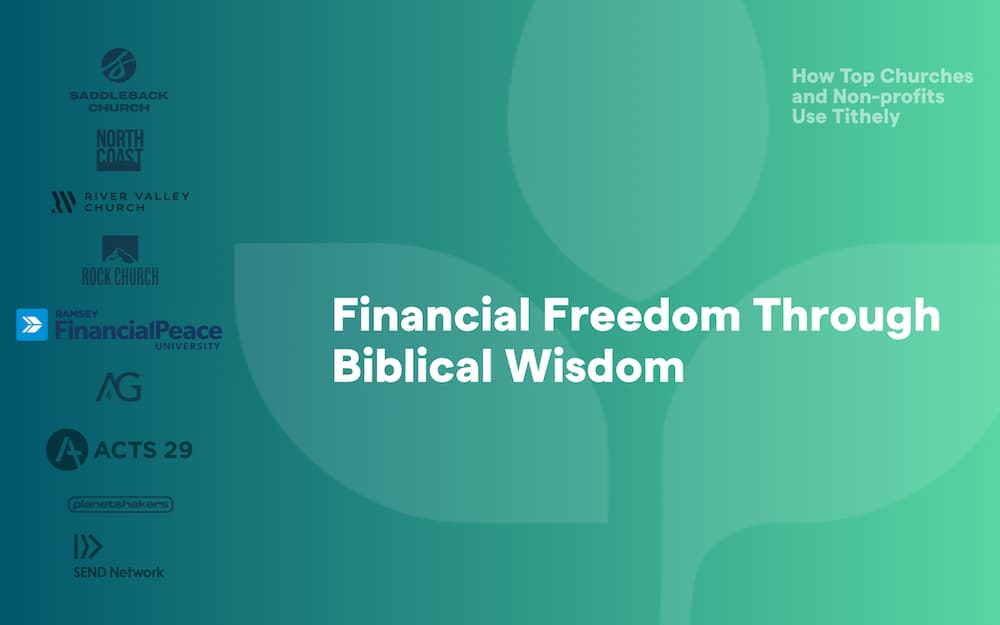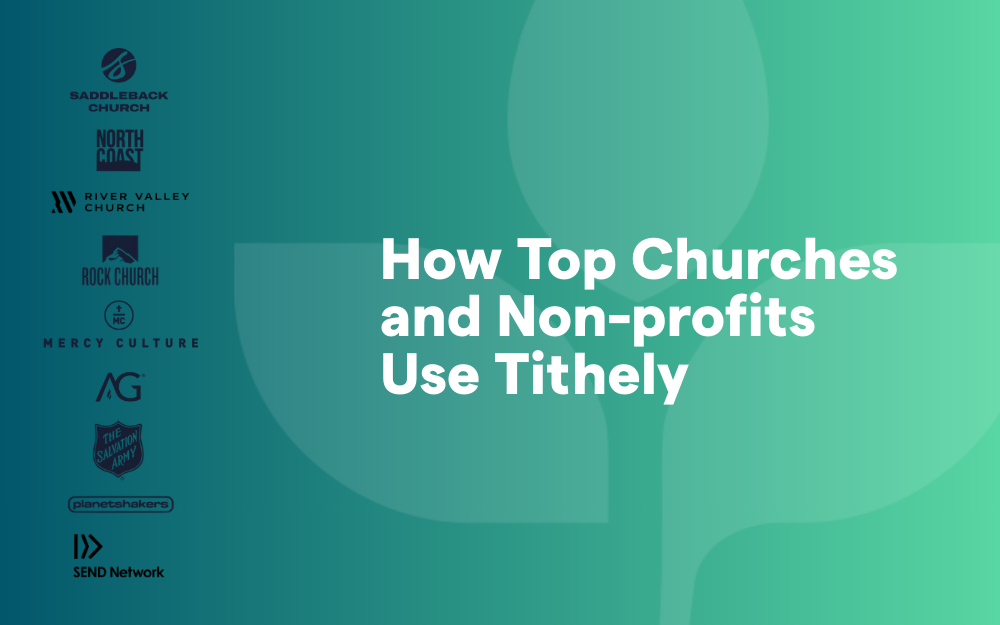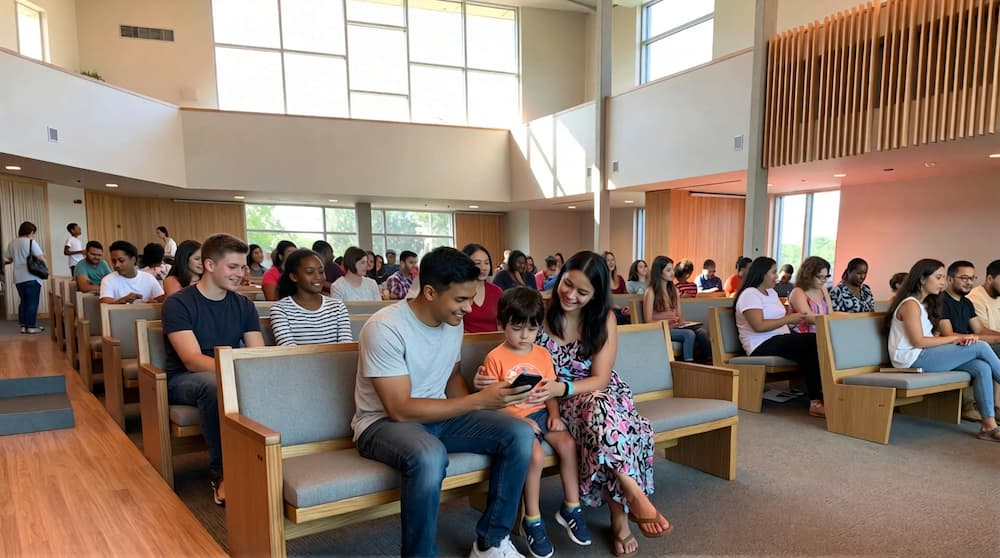PayPal for Churches: Weighing the Benefits and Costs
In the following article, we’ll take a look at what PayPal is, and why it may have both benefits and costs for churches.
In the ever-evolving landscape of digital transactions, PayPal stands out as a cornerstone in the realm of online payment systems.
Established in 1998, PayPal has grown from a simple e-commerce solution to a formidable payment platform, serving millions of users globally, including a significant segment of nonprofit organizations and churches. By allowing individuals and entities to send and receive funds electronically, PayPal has revolutionized the way we think about payment processing.
However, is PayPal right for churches to receive donations and contributions? In the following article, we’ll take a look at what PayPal is, and why it may have both benefits and costs for churches.
What is PayPal?
As a secure and trusted payment processor, PayPal enables transactions through a user's PayPal account, which can be linked to a bank account, debit card, or credit card. This versatility makes it an attractive option for consumers who want to buy goods or services or transfer funds, as it’s an easy and secure way to move cash on the internet.
For churches and ministries, PayPal can potentially be used as a fundraising tool, although it isn’t explicitly designed for churches or non-profits.
The Benefits of Embracing PayPal for Church Giving
First, let’s take a look at the potential benefits of using PayPal for churches.
Online Fundraising: With a PayPal donate button, churches can easily accept online donations, from credit card and debit card payments to bank account transfers. This functionality can potentially streamline the donation process, making it more accessible for givers who prefer online payment methods over in-person giving.
Recurring Donations and Donor Management: PayPal's system allows for the setup of recurring gifts, which is a boon for consistent church fundraising. Furthermore, the platform's donor management features help keep track of donation amounts and donor information, vital for maintaining relationships and managing church finances.
Versatility in Payment Processing: PayPal supports a variety of payment methods. It competes with other platforms like Venmo and provides a relatively smooth payment processor experience.
Extending Outreach Through Crowdfunding and E-commerce: For ministries looking to expand beyond the traditional donation page, PayPal integrates with crowdfunding initiatives and e-commerce functionalities. This can potentially allow for innovative fundraising tools.
Track Record: Because PayPal was established over two decades ago, it has a concrete track record of success that might make some churches and organizations feel more comfortable.
Free online giving tools for your church
Tithely provides the best online tools to help you increase generosity, manage your church, and engage your church members.
Sign Up Free
The Costs of Using PayPal for Nonprofit Organizations
As mentioned above, PayPal is not explicitly designed for churches or ministries. That means that it has several core disadvantages that churches should consider before using PayPal for their online giving or fundraising. Here are just a few drawbacks that churches should consider before choosing PayPal as their primary online fundraising tool.
Transaction Fees and Pricing Structures: While PayPal offers a business account with reduced transaction rates for nonprofits, the transaction fees and monthly fees can still add up, particularly for churches relying on small but frequent online donations. Plus, churches without their 501 c(3) status may not be able to take advantage of their discounted fees for nonprofits.
How much does PayPal take from donations? A domestic transaction fee for PayPal can go up to 3.5%, with a fixed fee up to 49 cents. The transaction fee for an international transaction is even higher–5%, or $5 for every $100 given. This expensive payment processing fee makes it less than ideal as a nonprofit payment processing tool, especially for donors who want to input large donation amounts of $1k or more to churches without their 501 c(3) status.
Not Designed with Churches in Mind: Next, PayPal is primarily a payment solution, not a donation processing software. It was designed to safeguard monetary transactions (always a good thing), but not to help churches and other nonprofits grow in giving or a culture of generosity. That means that it may lack tools and support staff that are committed to helping churches thrive! While PayPal does have a specific tool just for churches (called PayPal for Churches), it doesn’t have a simple setup process, requiring 11 steps to create a simple donate button (click here to learn more about PayPal for Churches).
Technical Considerations and Setup: The setup fee and need for technical know-how can be a barrier for some churches. While PayPal might offer an easy-to-use fundraising solution, setting up and customizing the donation form and ensuring seamless integration with existing church management systems can require a lot of technical know-how…which can be especially difficult for very small churches.
Lack of Integration with ChMS: It’s so important that churches have tools that are integrated smoothly. For example, a church’s contact database should sync with its giving tool. By using PayPal, churches add one more tool to their tech stack that may ultimately result in even more work for church administrators and church leaders. For example, a donor who gives through PayPal won’t automatically be synced to a church’s CRM, meaning that a church admin may have to manually log those details into the system.
Lack of Donor Management Tools: PayPal doesn’t offer donor management tools that make the giving experience ideal for church givers. In contrast to other payment options for churches, PayPal isn’t necessarily tailored for people who want to give to their church regularly or give to a special campaign (such as a building fund campaign). This means that the overall experience is less than ideal for both churches and church givers.
Are There Alternatives to PayPal?
PayPal presents a viable online fundraising tool for churches, balancing the ease of receiving online gifts with a range of customizable fundraising solutions. However, church leaders must carefully consider the pricing and the lack of integration with church management software.
The good news is that there are other fundraising solutions available that are specifically designed with churches in mind.
Tithely offers free giving tools for churches with low transaction fees and a range of donation methods, including credit/debit card giving, ACH/bank transfers, check scanning, and more. Tithely is safe and secure, and is designed specifically with church giving in mind, offering comprehensive reporting features (such as annual tax statements) and options for donors to cover the transaction fees, text-to-give, set up recurring giving options, and more.
In short, Tithely is built for people who tithe consistently to their local communities of faith!
Plus, Tithely has a dedicated payment system for purchasing goods and services beyond just donations. Tithely Pay is ideal for transactions at church-operated bookstores, cafés, and event booths, facilitating easy purchases for churchgoers, whether it's for merchandise or their favorite coffee.
Finally, Tithely has an additional set of tools for helping churches of every size to thrive. This includes capabilities for managing church member databases, sending out communications to members, overseeing volunteers, organizing worship services, creating a church website and app, and more.
If you’re interested in checking out Tithely as an online giving solution for your church, click here.
Sign Up for Product Updates
In the ever-evolving landscape of digital transactions, PayPal stands out as a cornerstone in the realm of online payment systems.
Established in 1998, PayPal has grown from a simple e-commerce solution to a formidable payment platform, serving millions of users globally, including a significant segment of nonprofit organizations and churches. By allowing individuals and entities to send and receive funds electronically, PayPal has revolutionized the way we think about payment processing.
However, is PayPal right for churches to receive donations and contributions? In the following article, we’ll take a look at what PayPal is, and why it may have both benefits and costs for churches.
What is PayPal?
As a secure and trusted payment processor, PayPal enables transactions through a user's PayPal account, which can be linked to a bank account, debit card, or credit card. This versatility makes it an attractive option for consumers who want to buy goods or services or transfer funds, as it’s an easy and secure way to move cash on the internet.
For churches and ministries, PayPal can potentially be used as a fundraising tool, although it isn’t explicitly designed for churches or non-profits.
The Benefits of Embracing PayPal for Church Giving
First, let’s take a look at the potential benefits of using PayPal for churches.
Online Fundraising: With a PayPal donate button, churches can easily accept online donations, from credit card and debit card payments to bank account transfers. This functionality can potentially streamline the donation process, making it more accessible for givers who prefer online payment methods over in-person giving.
Recurring Donations and Donor Management: PayPal's system allows for the setup of recurring gifts, which is a boon for consistent church fundraising. Furthermore, the platform's donor management features help keep track of donation amounts and donor information, vital for maintaining relationships and managing church finances.
Versatility in Payment Processing: PayPal supports a variety of payment methods. It competes with other platforms like Venmo and provides a relatively smooth payment processor experience.
Extending Outreach Through Crowdfunding and E-commerce: For ministries looking to expand beyond the traditional donation page, PayPal integrates with crowdfunding initiatives and e-commerce functionalities. This can potentially allow for innovative fundraising tools.
Track Record: Because PayPal was established over two decades ago, it has a concrete track record of success that might make some churches and organizations feel more comfortable.
Free online giving tools for your church
Tithely provides the best online tools to help you increase generosity, manage your church, and engage your church members.
Sign Up Free
The Costs of Using PayPal for Nonprofit Organizations
As mentioned above, PayPal is not explicitly designed for churches or ministries. That means that it has several core disadvantages that churches should consider before using PayPal for their online giving or fundraising. Here are just a few drawbacks that churches should consider before choosing PayPal as their primary online fundraising tool.
Transaction Fees and Pricing Structures: While PayPal offers a business account with reduced transaction rates for nonprofits, the transaction fees and monthly fees can still add up, particularly for churches relying on small but frequent online donations. Plus, churches without their 501 c(3) status may not be able to take advantage of their discounted fees for nonprofits.
How much does PayPal take from donations? A domestic transaction fee for PayPal can go up to 3.5%, with a fixed fee up to 49 cents. The transaction fee for an international transaction is even higher–5%, or $5 for every $100 given. This expensive payment processing fee makes it less than ideal as a nonprofit payment processing tool, especially for donors who want to input large donation amounts of $1k or more to churches without their 501 c(3) status.
Not Designed with Churches in Mind: Next, PayPal is primarily a payment solution, not a donation processing software. It was designed to safeguard monetary transactions (always a good thing), but not to help churches and other nonprofits grow in giving or a culture of generosity. That means that it may lack tools and support staff that are committed to helping churches thrive! While PayPal does have a specific tool just for churches (called PayPal for Churches), it doesn’t have a simple setup process, requiring 11 steps to create a simple donate button (click here to learn more about PayPal for Churches).
Technical Considerations and Setup: The setup fee and need for technical know-how can be a barrier for some churches. While PayPal might offer an easy-to-use fundraising solution, setting up and customizing the donation form and ensuring seamless integration with existing church management systems can require a lot of technical know-how…which can be especially difficult for very small churches.
Lack of Integration with ChMS: It’s so important that churches have tools that are integrated smoothly. For example, a church’s contact database should sync with its giving tool. By using PayPal, churches add one more tool to their tech stack that may ultimately result in even more work for church administrators and church leaders. For example, a donor who gives through PayPal won’t automatically be synced to a church’s CRM, meaning that a church admin may have to manually log those details into the system.
Lack of Donor Management Tools: PayPal doesn’t offer donor management tools that make the giving experience ideal for church givers. In contrast to other payment options for churches, PayPal isn’t necessarily tailored for people who want to give to their church regularly or give to a special campaign (such as a building fund campaign). This means that the overall experience is less than ideal for both churches and church givers.
Are There Alternatives to PayPal?
PayPal presents a viable online fundraising tool for churches, balancing the ease of receiving online gifts with a range of customizable fundraising solutions. However, church leaders must carefully consider the pricing and the lack of integration with church management software.
The good news is that there are other fundraising solutions available that are specifically designed with churches in mind.
Tithely offers free giving tools for churches with low transaction fees and a range of donation methods, including credit/debit card giving, ACH/bank transfers, check scanning, and more. Tithely is safe and secure, and is designed specifically with church giving in mind, offering comprehensive reporting features (such as annual tax statements) and options for donors to cover the transaction fees, text-to-give, set up recurring giving options, and more.
In short, Tithely is built for people who tithe consistently to their local communities of faith!
Plus, Tithely has a dedicated payment system for purchasing goods and services beyond just donations. Tithely Pay is ideal for transactions at church-operated bookstores, cafés, and event booths, facilitating easy purchases for churchgoers, whether it's for merchandise or their favorite coffee.
Finally, Tithely has an additional set of tools for helping churches of every size to thrive. This includes capabilities for managing church member databases, sending out communications to members, overseeing volunteers, organizing worship services, creating a church website and app, and more.
If you’re interested in checking out Tithely as an online giving solution for your church, click here.
podcast transcript
In the ever-evolving landscape of digital transactions, PayPal stands out as a cornerstone in the realm of online payment systems.
Established in 1998, PayPal has grown from a simple e-commerce solution to a formidable payment platform, serving millions of users globally, including a significant segment of nonprofit organizations and churches. By allowing individuals and entities to send and receive funds electronically, PayPal has revolutionized the way we think about payment processing.
However, is PayPal right for churches to receive donations and contributions? In the following article, we’ll take a look at what PayPal is, and why it may have both benefits and costs for churches.
What is PayPal?
As a secure and trusted payment processor, PayPal enables transactions through a user's PayPal account, which can be linked to a bank account, debit card, or credit card. This versatility makes it an attractive option for consumers who want to buy goods or services or transfer funds, as it’s an easy and secure way to move cash on the internet.
For churches and ministries, PayPal can potentially be used as a fundraising tool, although it isn’t explicitly designed for churches or non-profits.
The Benefits of Embracing PayPal for Church Giving
First, let’s take a look at the potential benefits of using PayPal for churches.
Online Fundraising: With a PayPal donate button, churches can easily accept online donations, from credit card and debit card payments to bank account transfers. This functionality can potentially streamline the donation process, making it more accessible for givers who prefer online payment methods over in-person giving.
Recurring Donations and Donor Management: PayPal's system allows for the setup of recurring gifts, which is a boon for consistent church fundraising. Furthermore, the platform's donor management features help keep track of donation amounts and donor information, vital for maintaining relationships and managing church finances.
Versatility in Payment Processing: PayPal supports a variety of payment methods. It competes with other platforms like Venmo and provides a relatively smooth payment processor experience.
Extending Outreach Through Crowdfunding and E-commerce: For ministries looking to expand beyond the traditional donation page, PayPal integrates with crowdfunding initiatives and e-commerce functionalities. This can potentially allow for innovative fundraising tools.
Track Record: Because PayPal was established over two decades ago, it has a concrete track record of success that might make some churches and organizations feel more comfortable.
Free online giving tools for your church
Tithely provides the best online tools to help you increase generosity, manage your church, and engage your church members.
Sign Up Free
The Costs of Using PayPal for Nonprofit Organizations
As mentioned above, PayPal is not explicitly designed for churches or ministries. That means that it has several core disadvantages that churches should consider before using PayPal for their online giving or fundraising. Here are just a few drawbacks that churches should consider before choosing PayPal as their primary online fundraising tool.
Transaction Fees and Pricing Structures: While PayPal offers a business account with reduced transaction rates for nonprofits, the transaction fees and monthly fees can still add up, particularly for churches relying on small but frequent online donations. Plus, churches without their 501 c(3) status may not be able to take advantage of their discounted fees for nonprofits.
How much does PayPal take from donations? A domestic transaction fee for PayPal can go up to 3.5%, with a fixed fee up to 49 cents. The transaction fee for an international transaction is even higher–5%, or $5 for every $100 given. This expensive payment processing fee makes it less than ideal as a nonprofit payment processing tool, especially for donors who want to input large donation amounts of $1k or more to churches without their 501 c(3) status.
Not Designed with Churches in Mind: Next, PayPal is primarily a payment solution, not a donation processing software. It was designed to safeguard monetary transactions (always a good thing), but not to help churches and other nonprofits grow in giving or a culture of generosity. That means that it may lack tools and support staff that are committed to helping churches thrive! While PayPal does have a specific tool just for churches (called PayPal for Churches), it doesn’t have a simple setup process, requiring 11 steps to create a simple donate button (click here to learn more about PayPal for Churches).
Technical Considerations and Setup: The setup fee and need for technical know-how can be a barrier for some churches. While PayPal might offer an easy-to-use fundraising solution, setting up and customizing the donation form and ensuring seamless integration with existing church management systems can require a lot of technical know-how…which can be especially difficult for very small churches.
Lack of Integration with ChMS: It’s so important that churches have tools that are integrated smoothly. For example, a church’s contact database should sync with its giving tool. By using PayPal, churches add one more tool to their tech stack that may ultimately result in even more work for church administrators and church leaders. For example, a donor who gives through PayPal won’t automatically be synced to a church’s CRM, meaning that a church admin may have to manually log those details into the system.
Lack of Donor Management Tools: PayPal doesn’t offer donor management tools that make the giving experience ideal for church givers. In contrast to other payment options for churches, PayPal isn’t necessarily tailored for people who want to give to their church regularly or give to a special campaign (such as a building fund campaign). This means that the overall experience is less than ideal for both churches and church givers.
Are There Alternatives to PayPal?
PayPal presents a viable online fundraising tool for churches, balancing the ease of receiving online gifts with a range of customizable fundraising solutions. However, church leaders must carefully consider the pricing and the lack of integration with church management software.
The good news is that there are other fundraising solutions available that are specifically designed with churches in mind.
Tithely offers free giving tools for churches with low transaction fees and a range of donation methods, including credit/debit card giving, ACH/bank transfers, check scanning, and more. Tithely is safe and secure, and is designed specifically with church giving in mind, offering comprehensive reporting features (such as annual tax statements) and options for donors to cover the transaction fees, text-to-give, set up recurring giving options, and more.
In short, Tithely is built for people who tithe consistently to their local communities of faith!
Plus, Tithely has a dedicated payment system for purchasing goods and services beyond just donations. Tithely Pay is ideal for transactions at church-operated bookstores, cafés, and event booths, facilitating easy purchases for churchgoers, whether it's for merchandise or their favorite coffee.
Finally, Tithely has an additional set of tools for helping churches of every size to thrive. This includes capabilities for managing church member databases, sending out communications to members, overseeing volunteers, organizing worship services, creating a church website and app, and more.
If you’re interested in checking out Tithely as an online giving solution for your church, click here.
VIDEO transcript
In the ever-evolving landscape of digital transactions, PayPal stands out as a cornerstone in the realm of online payment systems.
Established in 1998, PayPal has grown from a simple e-commerce solution to a formidable payment platform, serving millions of users globally, including a significant segment of nonprofit organizations and churches. By allowing individuals and entities to send and receive funds electronically, PayPal has revolutionized the way we think about payment processing.
However, is PayPal right for churches to receive donations and contributions? In the following article, we’ll take a look at what PayPal is, and why it may have both benefits and costs for churches.
What is PayPal?
As a secure and trusted payment processor, PayPal enables transactions through a user's PayPal account, which can be linked to a bank account, debit card, or credit card. This versatility makes it an attractive option for consumers who want to buy goods or services or transfer funds, as it’s an easy and secure way to move cash on the internet.
For churches and ministries, PayPal can potentially be used as a fundraising tool, although it isn’t explicitly designed for churches or non-profits.
The Benefits of Embracing PayPal for Church Giving
First, let’s take a look at the potential benefits of using PayPal for churches.
Online Fundraising: With a PayPal donate button, churches can easily accept online donations, from credit card and debit card payments to bank account transfers. This functionality can potentially streamline the donation process, making it more accessible for givers who prefer online payment methods over in-person giving.
Recurring Donations and Donor Management: PayPal's system allows for the setup of recurring gifts, which is a boon for consistent church fundraising. Furthermore, the platform's donor management features help keep track of donation amounts and donor information, vital for maintaining relationships and managing church finances.
Versatility in Payment Processing: PayPal supports a variety of payment methods. It competes with other platforms like Venmo and provides a relatively smooth payment processor experience.
Extending Outreach Through Crowdfunding and E-commerce: For ministries looking to expand beyond the traditional donation page, PayPal integrates with crowdfunding initiatives and e-commerce functionalities. This can potentially allow for innovative fundraising tools.
Track Record: Because PayPal was established over two decades ago, it has a concrete track record of success that might make some churches and organizations feel more comfortable.
Free online giving tools for your church
Tithely provides the best online tools to help you increase generosity, manage your church, and engage your church members.
Sign Up Free
The Costs of Using PayPal for Nonprofit Organizations
As mentioned above, PayPal is not explicitly designed for churches or ministries. That means that it has several core disadvantages that churches should consider before using PayPal for their online giving or fundraising. Here are just a few drawbacks that churches should consider before choosing PayPal as their primary online fundraising tool.
Transaction Fees and Pricing Structures: While PayPal offers a business account with reduced transaction rates for nonprofits, the transaction fees and monthly fees can still add up, particularly for churches relying on small but frequent online donations. Plus, churches without their 501 c(3) status may not be able to take advantage of their discounted fees for nonprofits.
How much does PayPal take from donations? A domestic transaction fee for PayPal can go up to 3.5%, with a fixed fee up to 49 cents. The transaction fee for an international transaction is even higher–5%, or $5 for every $100 given. This expensive payment processing fee makes it less than ideal as a nonprofit payment processing tool, especially for donors who want to input large donation amounts of $1k or more to churches without their 501 c(3) status.
Not Designed with Churches in Mind: Next, PayPal is primarily a payment solution, not a donation processing software. It was designed to safeguard monetary transactions (always a good thing), but not to help churches and other nonprofits grow in giving or a culture of generosity. That means that it may lack tools and support staff that are committed to helping churches thrive! While PayPal does have a specific tool just for churches (called PayPal for Churches), it doesn’t have a simple setup process, requiring 11 steps to create a simple donate button (click here to learn more about PayPal for Churches).
Technical Considerations and Setup: The setup fee and need for technical know-how can be a barrier for some churches. While PayPal might offer an easy-to-use fundraising solution, setting up and customizing the donation form and ensuring seamless integration with existing church management systems can require a lot of technical know-how…which can be especially difficult for very small churches.
Lack of Integration with ChMS: It’s so important that churches have tools that are integrated smoothly. For example, a church’s contact database should sync with its giving tool. By using PayPal, churches add one more tool to their tech stack that may ultimately result in even more work for church administrators and church leaders. For example, a donor who gives through PayPal won’t automatically be synced to a church’s CRM, meaning that a church admin may have to manually log those details into the system.
Lack of Donor Management Tools: PayPal doesn’t offer donor management tools that make the giving experience ideal for church givers. In contrast to other payment options for churches, PayPal isn’t necessarily tailored for people who want to give to their church regularly or give to a special campaign (such as a building fund campaign). This means that the overall experience is less than ideal for both churches and church givers.
Are There Alternatives to PayPal?
PayPal presents a viable online fundraising tool for churches, balancing the ease of receiving online gifts with a range of customizable fundraising solutions. However, church leaders must carefully consider the pricing and the lack of integration with church management software.
The good news is that there are other fundraising solutions available that are specifically designed with churches in mind.
Tithely offers free giving tools for churches with low transaction fees and a range of donation methods, including credit/debit card giving, ACH/bank transfers, check scanning, and more. Tithely is safe and secure, and is designed specifically with church giving in mind, offering comprehensive reporting features (such as annual tax statements) and options for donors to cover the transaction fees, text-to-give, set up recurring giving options, and more.
In short, Tithely is built for people who tithe consistently to their local communities of faith!
Plus, Tithely has a dedicated payment system for purchasing goods and services beyond just donations. Tithely Pay is ideal for transactions at church-operated bookstores, cafés, and event booths, facilitating easy purchases for churchgoers, whether it's for merchandise or their favorite coffee.
Finally, Tithely has an additional set of tools for helping churches of every size to thrive. This includes capabilities for managing church member databases, sending out communications to members, overseeing volunteers, organizing worship services, creating a church website and app, and more.
If you’re interested in checking out Tithely as an online giving solution for your church, click here.




























